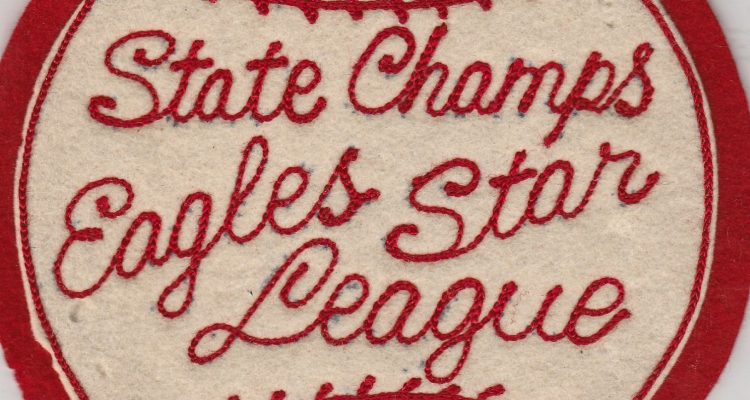(Editor’s Note: This chapter is the fourth entry of a series of stories that will focus on the history of the game of baseball in the Wheeling area.)
“It’s Because He Smiled A Lot”
It really didn’t matter how local sports scribes spelled his nickname or his last name in the local newspapers.
“Jacovetty” is the proper way, but “Jackovety” and “Jackovetty” appear in the cutout clippings his wife, Lolly, has laminated and saved, and spelling “Smiley” seemed a challenge, too, in the 1950s.
“I don’t recall those things ever bothering me, really because it was a surprise to me that I even made the newspapers,” Gerald Jacovetty admitted. “I didn’t pay a lot of attention to what was in the newspaper back then because I was just a kid playing baseball as often as I could. That’s all that I remember caring about, really, was playing the game.”
Jacovetty, now 80 years old, was raised on Baltimore Street in East Wheeling, and as soon as he reached the age when he was permitted to play in an organized league, he was a member of the neighborhood’s ball clubs.
“But I was playing well before then. I have no idea how old I was when I was in that first game, but I’m pretty sure it has to be soon after I started walking,” he said with his legendary smile. “I do remember that, before my first year, Bill Lias bought us all our uniforms, and yeah, we knew who Bill Lias was and what he did, and we knew he had the racetrack. No one cared because we had those uniforms.
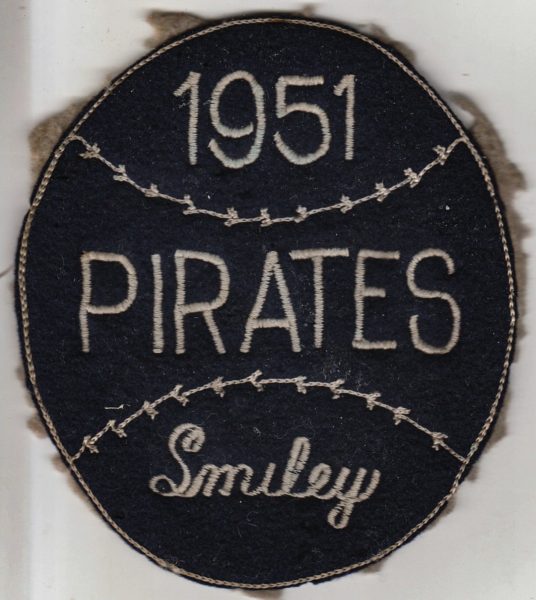
“But I can tell you I thought baseball was the greatest sport there ever was, and I certainly loved it,” Jacovetty said. “I loved playing the game, and I loved watching the game, and it really didn’t matter who was playing or where. It was baseball, and that’s all I cared about.”
At first, he was an East Wheeling Pirate, and Jacovetty remembered the Indians to the south and the Yankees to the north, but then he played for Wheeling High, American Legion, and then the Wheeling Eagles. While he was playing some in the outfield, Smiley explained, most often he was either behind the plate or on the mound.
“Tom Flading was one of our pitchers, and he was really good, and we had a few others, too, so I was either pitching, or I was catching the other guys,” Jacovetty said. “And I’ll be honest; I had a curveball that scared kids to death. I didn’t know why that was at first, but evidently it broke more than the curveballs the other kids threw at that time.
“I would just throw it right at right-handed hitters, and they always jumped out of the way of it,” he said with a snicker. “But then it would break right over the plate for a strike. I stuck out a lot of kids with that pitch, and I did throw it a lot. After the umpire would call it a strike, those boys would look at the ump like he was nuts.”
He threw a fastball and changeup, too, but his curve was the key.
“My curveball was definitely the best pitch I had on the mound, and I struck out quite a few over the years. I never laughed at the hitters, though, even if I would strike them all out three innings in a row,” Jacovetty explained. “The curveball was fantastic, and my fastball wasn’t too bad, either, and I couldn’t wait to throw it at a member of one of the older teams that were in Wheeling back in those days,
“By the time I got old enough to play for the Duquesne Club or the Cave Club, those teams folded up for some reason, and I still don’t know why, but I did get to play for Wheeling Legion back when Chi Chi Figaretti was the head coach. I had so many friends that were playing for the Wheeling Eagles, though, so I eventually decided to go play with them instead,” he continued. “And I don’t regret that. We had a lot of fun, and we won a lot, and that’s all that mattered.”
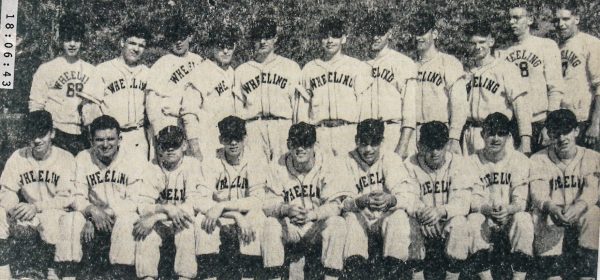
Faded Like the Clippings
Everett Brinkman was the head coach at Wheeling High, Jacovetty recalled, and a few of his teammates included Lee Springer, Bill Waller, and Eddie Waseman, but as for remembering mound marks and batting averages, well, those stats have faded in his mind over the 60-plus years since posting them.
A few of his preserved clippings reveal reports of a couple of hits in a win over Wellsburg, twirling six-hit ball to beat Windsor Heights, and, “Jacovetty’s relief pitching stopped the Brooke County nine … .”
“I’ve looked at those clippings, but I can’t tell you that I still remember the specifics about those particular games,” he admitted. “I do think about those days sometimes but not a lot, to be honest. Baseball, when I was a kid, was a pretty deal, and that’s why it hurt so much that those teams I really wanted to play for went away. That was a big surprise to me because of how many games were being played each day all over this city.
“I did play softball after that because that’s what those team became for some reason. It was fast-pitch so it wasn’t that easy, but it wasn’t baseball, either,” Jacovetty said. “I was an outfielder in softball and I didn’t pitch. It was way different in softball as far as pitching is concerned, but I did play for the sake of playing, but I really can’t tell you much more than that.”
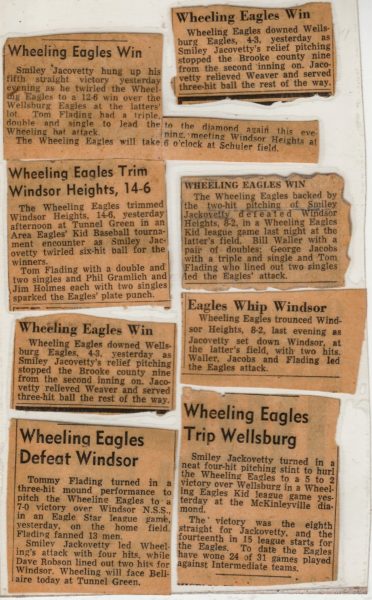
Some of his between-the-lines experiences, however, left a lasting impression.
The ballclub representing the Duquesne Club often played against the team formed by the guards at the West Virginia Penitentiary in Moundsville, and Jacovetty was recruited to pitch against the prisoners. On that day, this right-handed hurler found himself standing on a makeshift mound in the facility’s spacious south yard with “this really big guy” standing at home plate.
“I was still in high school, and Ed Donnelly was coaching the team from the Duquesne Club, and he asked me to join the team for a game because they were playing against the inmates,” Jacovetty recalled. “Donnelly took me down there, and he let me pitch.
“And yeah, I remember that first hitter being really big, but I was determined to strike him out,” he said, “My first pitch to that guy was a fastball and that prisoner crushed that ball over the wall. I have no idea how many feet that ball traveled, but I can tell you that the wall was so far away from home plate it didn’t look possible to do that. But that guy did it, and I guess the ball went out onto the street on the other side, and a kid picked it up or something.”
Jacovetty, though, refused to chalk up the long ball to nervousness.
“I don’t recall being scared while playing against those prisoners,” he said. “There were a few guards around, and there were more in those towers, and they were holding those rifles up there. But those guys also played against the Duquesne Club in ‘Goosetown’ every Easter Sunday. That game I remember pretty well because I would always go to watch it.
“I think everyone just kind of got used to the inmates because they were outside the walls of the pen a decent bit. At least it seemed like they were,” Jacovetty continued. “Most of the time they were put to work along the roads and things like that, and I don’t remember there ever being any issues. Even the inmate that took me over that prison wall didn’t gloat, and trust me; he could have. That ball had to travel a mile.”

Three Outs at a Time
He traveled to away games with his teammates in the back of a truck; the uniforms were made of itchy wool, and his cleats were hand-me-downs just like the rest of his wardrobe.
His father would go to the games when not working, but Jacovetty does not own a memory of his mother in the stands. Married to Lolly at 18, he tossed the baseball with his own boys, too, but they do not recall him throwing overhand to them at any time.
“That wasn’t because I hurt my arm,” he said. “That was because they were young back then. By the time they were old enough for me to throw harder, they had a bunch of friends to play catch with over on Wheeling Island.
“That’s where we moved to raise our family and baseball was really big over there,” Jacovetty reported. “They had teams on both ends of the Island and enough kids to fill two teams on every level, so my boys played a lot of baseball, and they all were pretty good.”
He feels he handed off the game of baseball to his three boys, Gerry, John, and Jeff, and Jacovetty was in the stands as often as possible.
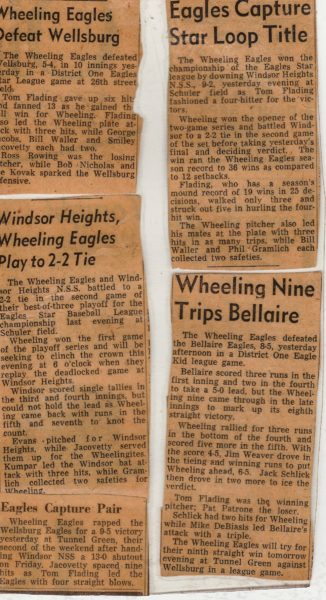
“Keeping up with all three of them was difficult sometimes because of the amount of time I was working to support the family, but I was there when I could be,” he said. “Even when they were playing, it seemed every community had their own teams, and back then we played, and they played baseball whenever it was possible whether or was organized or on a sandlot. That’s what we did,” he explained. “And when I got old enough, I was even the announcer for the Duquesne Club’s team, and there was always a lot of people who would go to those games.
“When I say a lot, I mean a couple of hundred people there,” Jacovetty continued. “But that’s what people did back then because the TV didn’t have hundreds of channels on it, and air conditioning, well, was more for the wealthy people. So, we played usually all day, and that’s what my boys did, too.”
He still smiles when discussing his days on the diamond although these days he remembers only the bigger moments. Initially, Jacovetty was a big fan of the Pittsburgh Pirates, and that was because he pitched against one or two of the professional ball club’s members.
“I did play against Gene Freese before he left town to play for the Pirates, but I don’t think I ever played against Bill Mazeroski. I knew about him, though,” he said. “I am still a fan of baseball, and I do still watch the Pirates when they are on TV. I’m not religious about it, though, because the Pirates haven’t won anything in a pretty long time.
“But if I am flipping around all of those channels and I see a game on, I’ll stop and watch some of it even though my all-time favorite Pittsburgh Pirate isn’t playing today because that’s Roberto Clemente. I just loved the way that man played the game of baseball,” he added. “When I did play in the outfield, I tried my best to play like Clemente.”
(images provided by the Jacovetty family)


